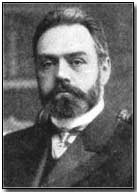Primary Documents - Alexander Guchkov on Military and Civil Unrest in Russia, 10 May 1917
 Reproduced below is the
text of an address given by the post-February Revolution Minister of War,
Alexander
Guchkov, on 10 May 1917.
Reproduced below is the
text of an address given by the post-February Revolution Minister of War,
Alexander
Guchkov, on 10 May 1917.
In his address Guchkov - who had received Tsar Nicholas II's formal abdication several months earlier - and who had been a moderate figure arguing in favour of constitutional reform both prior to and during wartime, argued that the fruits of the February Revolution were under threat on account of continuing "subversive" anarchy by elements in Russia. He argued that these figures sought "peace at any price and civil war, cost what it may".
In concluding Guchkov suggested that while it was not yet too late to save Russia from the "abyss", time was running short.
Click here to read a similar address by Minister of Justice Alexander Kerenski four days later. Click here to read the Manifesto of the Council of Workmen and Soldiers dated 15 May 1917 on the same subject; click here to read a second statement dated 23 July 1917; and another dated 25 July 1917.
Alexander Guchkov on Russian Civil Unrest
Unfortunately the first feeling of radiant joy evoked by the revolution has given place to one of pain and anxiety.
The Provisional Government explained the cause of this in its recent declaration, in which it was pointed out that the destruction of the old forms of public life, to which an end had been put by the revolution, had been effected more rapidly than had the creation of new forms to replace them.
It is especially regrettable that the destruction has touched the political and social organization of the country before any life centre has had time to establish itself and to carry out the great creative work of regeneration.
How will the State emerge from this crisis? That is the question for solution and on which will depend not only the consolidation of the liberties won, but the issue of the war and the destinies of the country. In any case, the duality of power - and even polyarchy - and the consequent anarchy now prevailing in the country make its normal existence difficult.
Our poor country is fighting at an extraordinary hard conjuncture of an unparalleled war and internal troubles such as we never have seen before, and only a strong Governmental power able to rely on the confidence of the nation can save it.
We received a terrible legacy from the old regime, which was incapable of governing in time of peace and still less was able to do so while waging war.
We all know the conditions in which our valiant army defended every foot of Russian territory and how it still is carrying on a truly heroic but not hopeless struggle. One more effort and an effort by the whole country and the enemy will be beaten, but we have got to know first of all whether we can make this effort.
The coup d'etat found echoes in the army and navy which, believing in their creative strength, unanimously adhered to the new regime and set to work on a radical reform of the armed forces of the country.
For the moment we hoped our military powers would emerge from the salutary process regenerated and renewed in strength and that a new reasonable discipline would weld the army together, but that has not been the case, and we must frankly face the fact that our military might is weakened and disintegrated, being affected by the same disease as the country, namely, duality of power, polyarchy, and anarchy, only the malady is more acute.
It is not too late to cure it, but not a moment must be lost. Those who, either deliberately or not realizing what they were doing, have cast into our midst the subversive mot d'ordre "peace at the front and war in the country," those people, I say, are carrying on a propaganda of peace at any price and civil war, cost what it may.
That mot d'ordre must be smothered by another, that being "war at the front and peace within the country."
Gentlemen, some time ago the country realized that our motherland was in danger. Since then we have gone a step further, for our motherland is on the edge of an abyss.
Source: Source Records of the Great War, Vol. V, ed. Charles F. Horne, National Alumni 1923
A Runner was a soldier who carried messages by hand.
- Did you know?
